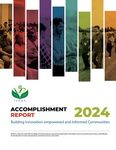ISAAA Publications
ISAAA develops an array of publications, videos, and presentation slides on various topics. These are available in hard copy, or in electronic format. Many of the materials are downloadable for free.
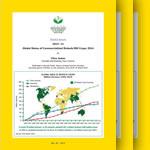 ISAAA Briefs
ISAAA Briefs
Major papers reviewing current developments in international biotechnology, sustainable agriculture, and technology transfer - a means for ISAAA to share its experience.
 Pocket K
Pocket K
Pocket Ks are Pockets of Knowledge, packaged information on crop biotechnology products and related issues available at your fingertips.
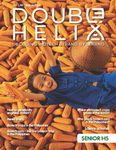 Double Helix
Double Helix
Double Helix was developed for senior high school students to help introduce them to agbiotech. The eight-page magazine is filled with illustrated stories, infographics, and activities to engage the young mind.
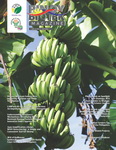 Pinoy Biotek Magazine
Pinoy Biotek Magazine
Pinoy Biotek Magazine aims to raise awareness, understanding, and acceptance of Pinoy biotech products that are derived from conventional and modern biotechnology. This magazine will be published in print and distributed for free to selected schools and institutions.
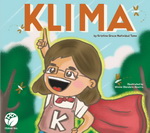 Storybooks
Storybooks
Science tells stories. Our collection of storybooks is designed to help young learners understand and appreciate biosciences. Each story has a call to change the world with scientific innovations.
 50 Biotech Bites
50 Biotech Bites
The book entitled 50 Biotech Bites contains 50 topics relevant to the science, applications, and issues behind agricultural biotechnology. It is based on pocket-sized publications called Pockets K or Pockets of Knowledge which have been developed by ISAAA for the last 15 years. Each topic is discussed using "bite-sized" information to "feed" hungry minds and engage with others on the technology to make informed decisions about its adoption and use.
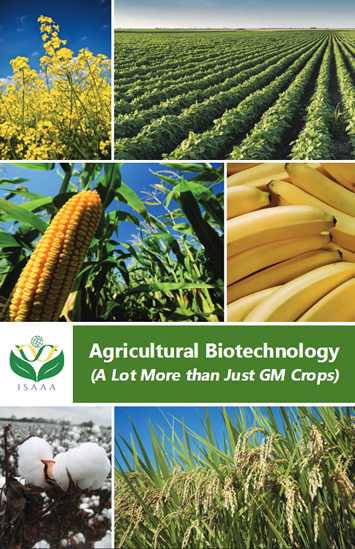 Agricultural Biotechnology (A Lot More than Just GM Crops)
Agricultural Biotechnology (A Lot More than Just GM Crops)
The booklet discusses in detail and in simple language agricultural biotechnology as it compares with conventional breeding, the agricultural biotechnology tools used in crops such as tissue culture and micropropagation, molecular breeding and marker-assisted selection, and genetic engineering and GM crops. A section on Answers to Frequently Asked Questions for food safety and environmental issues was also included to clarify important public concerns.
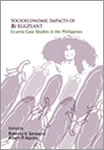 Socioeconomics Impacts of Bt Eggplant: Ex-ante Case Studies in the Philippines
Socioeconomics Impacts of Bt Eggplant: Ex-ante Case Studies in the Philippines
The book shares the findings of ex-ante studies on the market prospects and potential economic, health, and environmental impacts of the insect resistant Bt eggplant in the Philippines. The book featured studies on pesticide use, costs and returns of conventional eggplant production, and supply chains in eggplant marketing in top eggplant-producing provinces in the country.
Coffee Table Books
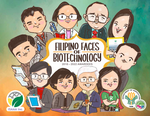 Filipino Faces of Biotechnology: 2016-2022 Awardees features a pictographic account of the awardees' lives, accomplishments, and contributions to biotechnology in the Philippines and abroad. Through their expertise and passion, they have pioneered groundbreaking discoveries and served as powerful symbols of the positive impact that biotechnology has brought to the Philippines.
Filipino Faces of Biotechnology: 2016-2022 Awardees features a pictographic account of the awardees' lives, accomplishments, and contributions to biotechnology in the Philippines and abroad. Through their expertise and passion, they have pioneered groundbreaking discoveries and served as powerful symbols of the positive impact that biotechnology has brought to the Philippines.
Biotech Booklets
 Myths and Facts about Agricultural Biotechnology answers 10 myths on agricultural biotech, providing facts and data relevant to each topic.
Myths and Facts about Agricultural Biotechnology answers 10 myths on agricultural biotech, providing facts and data relevant to each topic.
 Beyond Promises: Facts about Biotech/GM Crops in 2018 is a visual presentation of the 10 important highlights about biotech crops from 1996 to 2018, taken from ISAAA Brief 54: Global Status of Commercialized Biotech/GM Crops: 2018.
Beyond Promises: Facts about Biotech/GM Crops in 2018 is a visual presentation of the 10 important highlights about biotech crops from 1996 to 2018, taken from ISAAA Brief 54: Global Status of Commercialized Biotech/GM Crops: 2018.
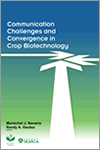 Communication Challenges and Convergence in Crop Biotechnology
Communication Challenges and Convergence in Crop Biotechnology
The book presents case studies that offer unique and rich examples of how countries have been able to guide through the 'drama' of crop biotechnology as they shepherd innovations from the laboratory, greenhouse trials, multi-location trials, and hopefully to farmers' fields.
 Biotech sQuizBox: All About Gene Editing
Biotech sQuizBox: All About Gene Editing
ISAAA releases another edition of its popular publication, Biotech sQuizBox. This addition to the series of accordion-type booklet focuses on gene editing and contains answers to frequently asked questions (FAQ) on gene editing, including the following:
- What is gene editing?
- How does gene editing work?
- What is the difference between genetic enginering and gene editing?
- Is gene editing safe?
- What are the gene-edited products in the market?
 Biotech sQuizBox (Not Just for Kids)
Biotech sQuizBox (Not Just for Kids)
ISAAA releases the new version of Biotech sQuizBox (Not Just for Kids), an activity booklet on biotechnology. The publication is designed to inform the public on biotech through trivia and puzzles in cartoons. It also provides URLs and QR codes directing to more biotech information online.
 Biotech sQuizBox
Biotech sQuizBox
Biotech sQuizBox is an accordion-type cartoon publication that aims to inform secondary school students about crop biotechnology. One side of the booklet contains snippets of basic information about the history, development, and benefits of biotech crops. The other side of the booklet challenges the readers to answer exciting quizzes to further understand the subject matter. The activities include DNA extraction exercise, scientist appreciation activity, puzzles, and word problem, which can be done individually or as a group in science classes.
Translations: Urdu
Biotech Communication Series
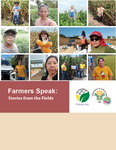 Farmers Speak: Stories from the Fields
Farmers Speak: Stories from the Fields
For farmers, the adoption of biotech crops has translated to higher productivity and greater financial stability. This is evident in the stories and experiences of the farmers featured in Farmers First: Feedback from the Farm. In the second edition, Farmers Speak: Stories from the Fields spotlights success stories from biotech corn farmers in the Philippines.
 Points to Ponder on Gene Editing: Can We Edit the Future of Food?
Points to Ponder on Gene Editing: Can We Edit the Future of Food?
Gene editing is a powerful new technology that has the potential to revolutionize the way we produce food. By making precise changes to the DNA of plants and animals, gene editing can help to increase yields, improve resistance to pests and diseases, and even create new varieties of crops that are better suited to our changing climate.
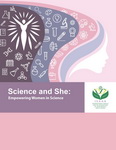 Science and She: Empowering Women in Science
Science and She: Empowering Women in Science
Building a culture that empowers women motivates them to do great things in science that will benefit their personal lives and the society. Their knowledge and experiences will lead the public to appreciate science and make informed decisions about technology applications such as biotechnology.
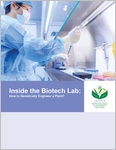 Inside the Biotech Lab: How to Genetically Engineer a Plant?
Inside the Biotech Lab: How to Genetically Engineer a Plant?
Inside the Biotech Lab: How to Genetically Engineer a Plant? is a visual documentation of how scientists conduct genetic transformation in the laboratory.
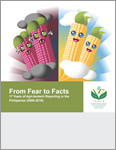 From Fear to Facts:
17 Years of Agri-biotech Reporting in the Philippines (2000-2016)
From Fear to Facts:
17 Years of Agri-biotech Reporting in the Philippines (2000-2016)
The publication is based on a study conducted by ISAAA and SEARCA Biotechnology Information Center published in the April 2017 issue of Philippine Journal of Crop Science.
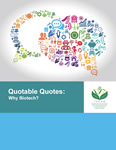 Quotable Quotes: Why Biotech?
Quotable Quotes: Why Biotech?
The quotes are taken from ISAAA Brief 50 Voices and Views: Why Biotech? which highlight the perspectives of various key stakeholders from Africa, Asia, Europe, and North America who have followed the advancement of biotechnology and are convinced that the technology is vital in improving the quality of life.
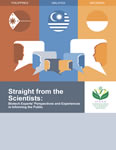 Straight from the Scientists: Biotech Experts' Perspectives and Experiences in Informing the Public
Straight from the Scientists: Biotech Experts' Perspectives and Experiences in Informing the Public
In the eyes of the public, academics and scientists are at the topmost level of the credibility ladder, being the most relable and trusted sources of information on biotechnology. To know how academics and scientists play their role in biotech communication, a study was conducted by ISAAA. The results of the study are published in the August issue of Philippine Journal of Crop Scienc. The highlights of study is packaged in this monograph.
 Farmers First: Feedback from the Farm
Farmers First: Feedback from the Farm
A collection of farmers' testimonies from China, India, and the Philippines, about how they started adopting biotech crops, how they benefited from the technology, and why they continue planting biotech crops.
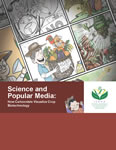 Science and Popular Media: How Cartoonists Visualize Crop Biotechnology
Science and Popular Media: How Cartoonists Visualize Crop Biotechnology
This monograph highlights the research findings of a study to determine how cartoonists in Philippine national newspapers "define" biotechnology. In addition, it discusses Biotechtoons, a contest for cartoonists on biotechnology, and initiatives by other countries to help popularize technology concepts and issues.
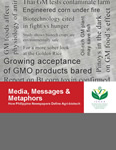 Media, Messages & Metaphors
Media, Messages & Metaphors
The study underscores the relationship between science and media and the process of negotiating public or popular images of science. It analyzed media coverage, sources of articles, tone, media frames, use of metaphors, and article titles.
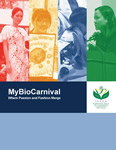 MyBio Carnival: Where Passion Meets Fashion
MyBio Carnival: Where Passion Meets Fashion
ISAAA and the Malaysian Biotechnology Information Centre (MABIC) releases this brochure that shows the activities of a week-long activity to introduce the wonders of science in a playful, relaxing, and participative mode.
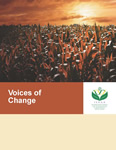 Voices of Change
Voices of Change
This brochure is a synthesis of Brief 40 on Communicating Crop Biotechnology: Stories from Stakeholders. It highlights how different audiences respond to science communication efforts, thus building a collective voice on crop biotechnology.
Policy Briefs
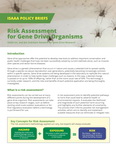 ISAAA Inc., in partnership with the Outreach Network for Gene Drive Research, launches these policy brief:
ISAAA Inc., in partnership with the Outreach Network for Gene Drive Research, launches these policy brief:
- Risk Assessment for Gene Drive Organisms - The brief recommends that risk assessments must be consistent with the principle of case-by-case assessment since there are various types of gene drive constructs developed for different applications and contexts.
- Environmental, Socio-economic, and Health Impact Assessment (ESHIA) for Gene Drive Organisms - According to the policy brief, ESHIA is helpful because it offers an analysis that helps assess the advantages and disadvantages of action and inaction, which is important to inform decisions. ESHIA and ERA complement each other, and their findings should be considered in decision-making.
- Field Evaluations of Gene Drive Organisms - According to the policy brief, field evaluations are needed to understand the performance, spread, and persistence of a gene drive organism in a given environment. Several field evaluations of different designs and sizes might be needed to demonstrate the effectiveness of a proposed application. Field evaluations for proposed gene drive applications are part of a multi-phase research process and will inform several important considerations that researchers must address to prepare for an experimental release, including safety and impacts, acceptability for affected stakeholders, and the logistics of its implementation.
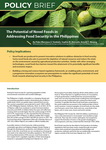 ISAAA Inc., in partnership with the Philippine Agriculture and Fisheries Biotechnology Program (DA Biotech), publish the Policy Brief series:
ISAAA Inc., in partnership with the Philippine Agriculture and Fisheries Biotechnology Program (DA Biotech), publish the Policy Brief series:
- Beyond the Label: Unpacking the Lessons of GM Food Labeling Policies - Dr. Nina Gloriani, Consultant, Clinical Microbiology, St. Luke's Medical Center and Dr. Rhodora Aldemita, Executive Director, ISAAA Inc.
- Advancing Philippine Agriculture: Strategic Framework for the Commercialization of Biotech Innovations - Dr. Abraham Manalo, Assistant Professor at the National College of Public Administration and Governance at UP Diliman and the Executive Secretary of the Biotechnology Coalition of the Philippines (BCP)
- The Potential of Novel Foods in Addressing Food Security in the Philippines - Dir. Fides Marciana Z. Tambalo, Ms. Sophia M. Mercado, and Mr. Arnold T. Abuyog of the University of the Philippines Los Baños - National Institute of Molecular Biology and Biotechnology (UPLB-BIOTECH)
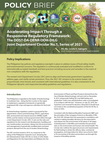 ISAAA, in partnership with the Philippine Agriculture and Fisheries Biotechnology Program and the Southeast Asian Regional Center for Graduate Study and Research and Agriculture (SEARCA), publish the 2022 Policy Brief series:
ISAAA, in partnership with the Philippine Agriculture and Fisheries Biotechnology Program and the Southeast Asian Regional Center for Graduate Study and Research and Agriculture (SEARCA), publish the 2022 Policy Brief series:
- Accelerating Impact Through a Responsive Regulatory Framework: the DOST-DA-DENR-DOH-DILG Joint Department Circular No. 1, Series of 2021 - Ms. Ma. Lorelie U. Agbagala, Assistant Scientist at the Department of Science and Technology (DOST) and Head Secretariat of the National Committee on Biosafety of the Philippines
- To Regulate, or Not to Regulate, the Answer to the Question: The NCBP Policy on Plant Breeding Innovations or New Breeding Techniques - Ms. Ma. Lorelie U. Agbagala, Assistant Scientist at the Department of Science and Technology (DOST) and Head Secretariat of the National Committee on Biosafety of the Philippines
- Modern Animal Biotechnology: Benefits, Future Directions, and Policy Recommendations - Ernelea P. Cao, PhD, Professor, Institute of Biology, College of Science, University of the Philippines, Diliman, Quezon City, Philippines
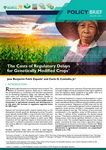 The 2018 Policy Brief series is produced in partnership with the International Service for the Acquisition of Agri-biotech Applications (ISAAA), Coalition for Agriculture Modernization in the Philippines (CAMP), Department of Agriculture-Biotechnology Program Office (DA-BPO), Program for Biosafety Systems (PBS), and DA-Bureau of Agricultural Research (DA-BAR).
The 2018 Policy Brief series is produced in partnership with the International Service for the Acquisition of Agri-biotech Applications (ISAAA), Coalition for Agriculture Modernization in the Philippines (CAMP), Department of Agriculture-Biotechnology Program Office (DA-BPO), Program for Biosafety Systems (PBS), and DA-Bureau of Agricultural Research (DA-BAR).
- The Costs of Regulatory Delays for Genetically Modified Crops - Jose Benjamin Falck Zepeda and Carlo G. Custodio, Jr.
- Strengthening Support for Biotechnology in the Philippines - Coalition for Agriculture Modernization in the Philippines (CAMP)
- Broad Scientific Consensus on Safety of GMO Technology - Emil Q. Javier
- New Plant Breeding Techniques: CRISPR/Cas9 System - Emil Q. Javier
- Personal Constructs and Social Discourses on Genetically Modified Organisms (GMOs) - Maria Monina Cecilia Q. Arcelo-Villena
Reports
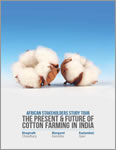 African Stakeholders Study Tour: The Present & Future of Cotton Farming in India
African Stakeholders Study Tour: The Present & Future of Cotton Farming in India
The report captures the experiences and lessons learned from a week-long seeing-is-believing study tour by a delegation of six East and Southern African cotton growing countries to Bt cotton hybrid fields in India from September 27- October 2, 2015
 International Workshop for Islamic Scholars on Agribiotechnology: Shariah Compliance
International Workshop for Islamic Scholars on Agribiotechnology: Shariah Compliance
Proceedings of the workshop held at Georgetown, Penang, Malaysia on 1-2 December 2010
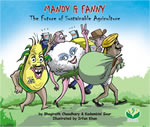 Mandy and Fanny: The Future of Sustainable Agriculture
Mandy and Fanny: The Future of Sustainable Agriculture
The novel educational cartoon publication "Mandy & Fanny : The Future of Sustainable Agriculture" illustrates the attributes of biotech/genetically modified (GM) crops –biotech maize (corn) and biotech cotton and are viewed as the "Tom and Jerry" of modern biotech agriculture. The rationale for creating the cartoon around biotech crops is to spread the factual messages about biotech crops as the popular media is rife with misinformation on biotech crops.
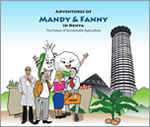 Adventures of Mandy & Fanny in Kenya: The Future of Sustainable Agriculture
Adventures of Mandy & Fanny in Kenya: The Future of Sustainable Agriculture
Mandy and Fanny pay a visit to Kenya and are surprised by the negative publicity in the media.They decide to take an educational tour of the country and interact with major stakeholders: Government representatives, Politicians and opinion leaders, Journalists, Farmers, and Consumers.
During the tour, they provide useful insights on biotechnology and its benefits as well as correct the misconceptions about crop biotechnology.
 GMO Knowledge Campus (in Chinese)
GMO Knowledge Campus (in Chinese)
Join DoDo, LeLe, and Mimi as they explain the safety and benefits of genetically modified crops. Developed by the Chinese Society of Biotechnology (CSBT) and the China Biotechnology Information Center (ChinaBIC).
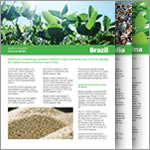 Biotech Country Facts and Trends
Biotech Country Facts and Trends
Country Biotech Facts and Trends are one- to two-page summaries that highlight the commercialization of biotech crops in the developing countries. Data on biotech crop commercialization (hectarage and adoption), approvals and planting, benefits and future prospects in each country are presented in a brief and easily understandable manner. The contents are all based on the annual ISAAA Brief on the Global Report of Commercialized Biotech/GM Crops.
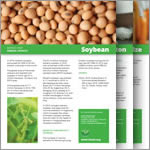 Biotech Crop Annual Update
Biotech Crop Annual Update
Short documents on adoption, adopting countries, traits and benefits of major biotech crop.
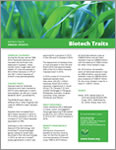 Biotech Trait Annual Update
Biotech Trait Annual Update
The publication includes short discussions about the trends in biotech traits adoption and benefits of biotech crops with such traits.
Biotech Crop Profiles
ISAAA Series of Biotech Crop Profiles featuring a comprehensive overview of the adoption, impact and future prospects of biotech crops in developing countries.
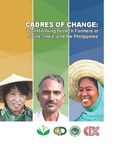 Cadres of Change: Transforming Biotech Farmers in China, India, and the Philippines
Cadres of Change: Transforming Biotech Farmers in China, India, and the Philippines
A monograph from the John Templeton Foundation Project entitled Adoption and Uptake Pathways of GM/Biotech Crops by Small-scale, Resource-poor Farmers: Comparative Studies in China, India, and the Philippines. This project aims to analyze the dynamics of adoption and uptake pathways of biotech crops in the three countries and the changes these have brought about in resource-poor farmers' lives. This project will forward concrete empirical basis for understanding farmer adoption of biotech crops of which very little information is available from the developing world. It will provide insights into developing paradigms and strategies to increase farmer acceptation and adoption of a beneficial technology.
- China: Adoption and Uptake Pathway of GM Technology by Chinese Smallholders: Evidence from Bt Cotton Production, Highlights (English, Chinese)
- India: Adoption and Uptake Pathway of Bt Cotton in India, Executive Summary (Hindi), Highlights, Press Release (Hindi)
- Philippines: Adoption and Uptake Pathway of GM/Biotech Crops by Small-scale, Resource-poor Filipino Farmers, Highlights (English, Filipino)
See also: Cadres of Change Video, Intrernational Conference Highlights
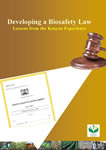 Developing a Biosafety Law- Lessons from the Kenyan Experience
Developing a Biosafety Law- Lessons from the Kenyan Experience
The book Developing a Biosafety Law: Lessons from the Kenyan Experience seeks to document the development of the Kenya Biosafety Law and its progress through three Parliaments and two General Elections. The authors strongly believe that the enactment of science-based biosafety legislation should be guided by facts, education, collective action and inclusion of all interested parties. The book also provides an analysis of the lessons learnt and how this can benefit other developing countries that are yet to have an equivalent law in place.
 Projected Impacts of Agricultural Biotechnologies for Fruits and Vegetables in the Philippines and Indonesia
Projected Impacts of Agricultural Biotechnologies for Fruits and Vegetables in the Philippines and Indonesia
The book presents the projected level and distribution of costs and benefits associated with the featured biotech crops based from a series of ex-ante impact assessment studies supported by the Agricultural Biotechnology Support Project II (ABSPII) and the International Service for the Acquisition of Agri-biotech Applications (ISAAA). The book is co-published by ISAAA and the Southeast Asian Regional Center for Graduate Study and Research in Agriculture (SEARCA).
Research Briefs
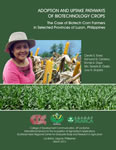 Adoption and Uptake Pathways of Biotech Crops in the Philippines
Adoption and Uptake Pathways of Biotech Crops in the Philippines
Peer and kinship systems facilitate the adoption and uptake pathways of biotech corn in some provinces of the Philippines, that is according to the researchers at the University of the Philippines Los Baños. They conducted a survey in 2011 to analyze how biotech corn farmers started to adopt the technology and to understand the role of communication in the farmers' decision to adopt and share information about the crop.
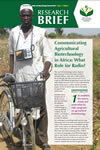 Communicating Agricultural Biotechnology in Africa: What Role for Radio?
Communicating Agricultural Biotechnology in Africa: What Role for Radio?
The brief captures findings of a research project conducted by Africenter and partners from 2008 to 2011 on Radio use in communicating agricultural biotechnology in Africa using Burkina Faso and Kenya as case studies. The two countries have recorded increased activity and growth in research, development and policy formulation in agricultural biotechnology over the last 5 years.
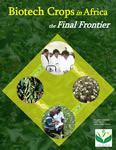 Biotech Crops in Africa: The Final Frontier
Biotech Crops in Africa: The Final Frontier
The booklet captures some key developments in agricultural biotechnology in Africa. The document narrates notable scientific breakthroughs, political support, policy formulation, capacity building and awareness creation on agricultural biotechnology in Africa. It highlights activities in three African countries (South Africa, Burkina Faso and Egypt) that have commercialized biotech crops and are now experiencing socio economic benefits as well as improved environmental conservation.
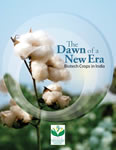 The Dawn of a New Era
The Dawn of a New Era
This publication aims to provide a comprehensive and up-to-date status of the field trials and commercialization of biotech crops in India in 2008. It also includes the most authoritative coverage and statistics of Bt cotton, including hectarage of Bt cotton hybrids planted in India, numbers of farmers growing hybrids and approval of different events and hybrids in India from 2002 to 2008.
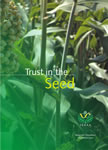 Trust in the Seed
Trust in the Seed
This publication highlights the significance of the seed and new crop technologies. It captures the experiences of three key developments in Indian agriculture that sustained growth in agriculture, contributed to increased food production and the alleviation of poverty and hunger.
Download Trust in the Seed (Hindi Version) (PDF:13.91MB)]
 Bridging the Knowledge Divide: Experiences in Communicating Crop Biotechnology
Bridging the Knowledge Divide: Experiences in Communicating Crop Biotechnology
This handbook is ISAAA's contribution to the field of science communication in general, and biotechnology communication in particular. The handbook distills the experiences in communicating crop biotechnology by the Global Knowledge Center on Crop Biotechnology and its network of Biotechnology information Centers (BICs) and theoretical perspectives of science communication experts. [Download Options ]
 Genes are Gems: Reporting Agri-Biotechnology
Genes are Gems: Reporting Agri-Biotechnology
"Genes are Gems" is a collection of knowledge and wisdom gained from media workshops organized by the International Crops Research Institute for the Semi-Arid Tropics (ICRISAT) and supported by the International Service for the Acquisition of Agri-Biotech Applications (ISAAA) and the United Nations Educational, Scientific and Cultural Organization (UNESCO). It will surely be a handy reference book for science communicators and journalists.
[Download PDF: English (966KB) | French (1.11MB)]
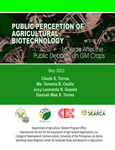 Perception Studies
Perception Studies
These studies were conducted to determine the stakeholders' socio-demographic characteristics, worldviews and values, information sources as well as their level of understanding and perception of, and attitude towards agricultural biotechnology.
- Public Perception of Agricultural Biotechnology: 16 Years After the Public Debates on GM Crops
- The Social and Cultural Dimensions of Agricultural Biotechnology in Southeast Asia
Download PDF [ Indonesia (245KB), Malaysia (258KB), Philippines (417KB), Thailand (254KB), Vietnam (307KB) ] - Public Understanding and Perception of and AttitudeTowards Agricultural Biotechnology
Download PDF [ Indonesia (1MB) | Philippines (2.3MB) ]
See Also ABSPII
 Tribute to Norman Borlaug
Tribute to Norman Borlaug
ISAAA Pays Tribute to its Founding Patron, Nobel Peace Laureate Norman Borlaug, 1914 - 2009

